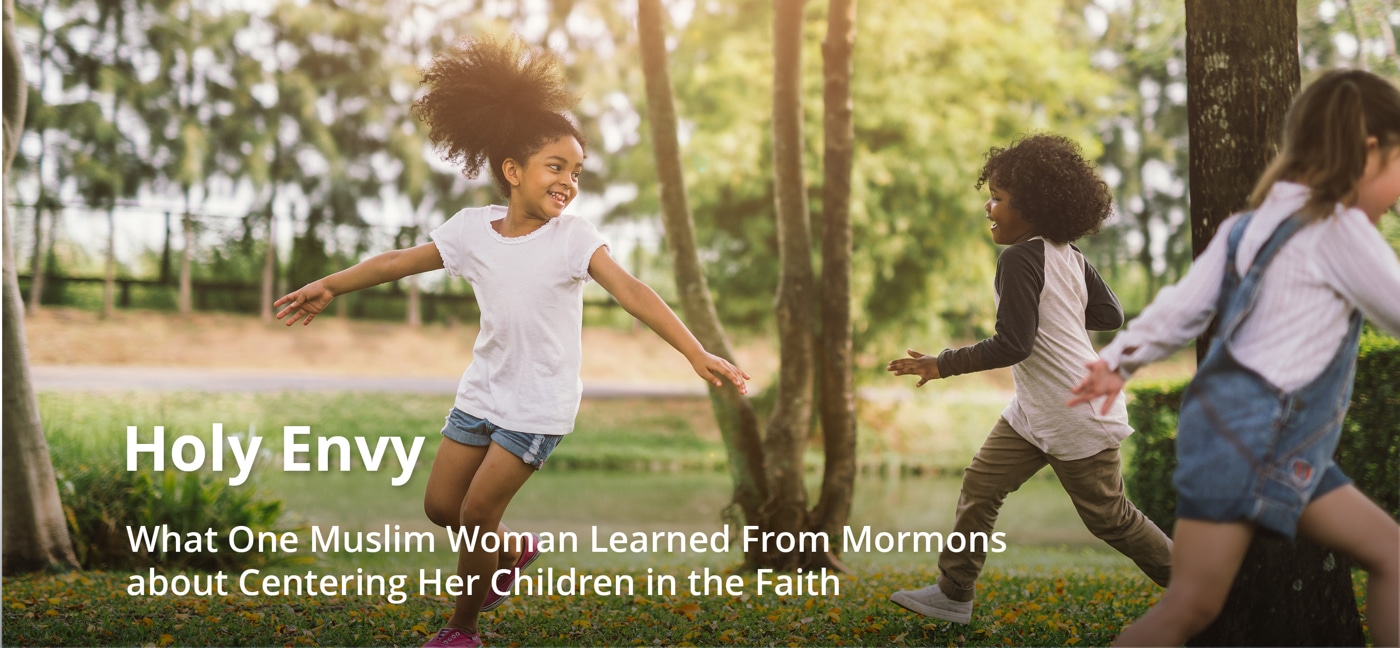Holy Envy: What One Muslim Woman Learned From Mormons about Centering Her Children in the Faith

“Terrorism dominates the news, anti-Muslim sentiment is rising and American Muslim kids are bullied by young people and adults alike. As parents, we wonder: How do we make our children feel safe even when we don’t? How do we make them feel safe about their faith?”
I wrote that in an opinion-editorial for The Washington Post a few years ago, co-authoring with a friend, a young mother like myself, who was confounded by the same question. In the piece, we interviewed several other American Muslim parents, all expressing similar concerns about protecting faith and spirituality in an age of politicized religion.
Each of us shared practices we implement to buffer our kids from outside spiritual threats. There have been plenty of times when I have rushed to turn off CNN when my daughter walked in to hear politicians declare “Islam hates us” or to video footage of the latest horrific terrorist attack.
But buffering can go only so far. We need tools to help youth stay firmly rooted in their faiths and remain conscious of God’s presence even when—especially when—the outside world threatens to rip away their spiritual wonder and certainty. Many of the parents I interviewed for my op-ed said their solution was to ground their children first and foremost in the basics of Islam.
What else can Muslim parents do? And is there anything from other faith practices that might work for us, too? Based on my interactions with believers from other faith communities, I am certain there is.
Mormon practice, in particular, fascinates me. This is partly because The Church of Jesus Christ of Latter-day Saints, with its history of religious liberty persecution, provides models of perseverance for American Muslims today. It also has a uniquely American flavor at a time when American Muslims are still struggling to strengthen their communities and build institutions. In this moment when such institutions are few and far between, I envy the organization of the LDS Church, particularly for its effects on youth.
One sociologist, Kenda Creasy Dean of Princeton Theological Seminary, has found that Mormonism is uniquely successful in cultivating youth “who firmly understand what they believe and why their faith needs to have a claim on their behavior.” She identifies four elements of this success:
- Mormon youth know their faith, and they know it well. They don’t learn it from media or from friends outside their faith community. They aren’t fed generalities or what Dean calls the “feel-good stuff.” And there’s both an institutional and home dimension to their teaching. Classes happen in both venues, helping to connect what happens outside the home to what happens in the kids’ safest, most intimate spaces.
- Mormon youth are taught to articulate what their faith is and why they participate in their religious practices. By translating knowledge into testimony, they acquire key skills, like leadership, storytelling, and the ability to connect with others personally.
- It’s not all talk — action matters too. Mormon youth define their goals and work toward achieving them. Contributions start small but early — tithing, volunteering for service projects, and Church building upkeep.
- Purpose isn’t defined in earthly terms only. The ultimate reason and hope of religious life is to be successful in the life that comes after death.
Some of these overlap with Muslim practices, particularly the focus on life after death — as the Prophet Muhammad advised, “Be in this world as though you were a wayfarer.” Life is entirely about journeying to the hereafter. This sort of focus can’t help but buttress one’s spirituality.
But other areas of overlap show how the modern experience of Islam can learn from Mormonism. Consider, for example, the second element above: articulating one’s faith. In our current political climate, every young American Muslim is expected by the larger society to serve as a spokesman for the faith. Yet, unlike the Mormon articulation of faith, this spokesmanship tends to focus on apologetics and political talking points. Even worse, it begins to chip away from the experience of Islam as religion.
When it comes to learning the faith, there is also room to improve. So many young American Muslims today learn about their faith through media. For us, learning has all too often become a matter of reaction: What are others saying about Islam and how do we respond? How do we defend our practices from ugly accusations? Again, I lament the spiritual emptiness that comes with politicized religion. Meanwhile, the beauty of Islamic beliefs is inviting to be discovered more richly.
I realize that so much of what I envy about Mormonism is its ability to extract itself from its surroundings and focus inwardly. The Church has faced and continues to face challenges from without, but it keeps its adherents firmly centered on substantive beliefs translated into concrete, impactful actions. In my own experience of faith, particularly as I transmit it to my kids, the Mormon model of centeredness is something I seek to replicate.
Asma Uddin is the founder and editor-in-chief of altmuslimah.com. She is also a lawyer and scholar specializing in American and international religious liberty.
Editor’s note: This essay is part of an ongoing series on Holy Envy. People of various religions explain what they admire in other faiths. The purpose is to increase understanding and solidarity between believers.
![]()



